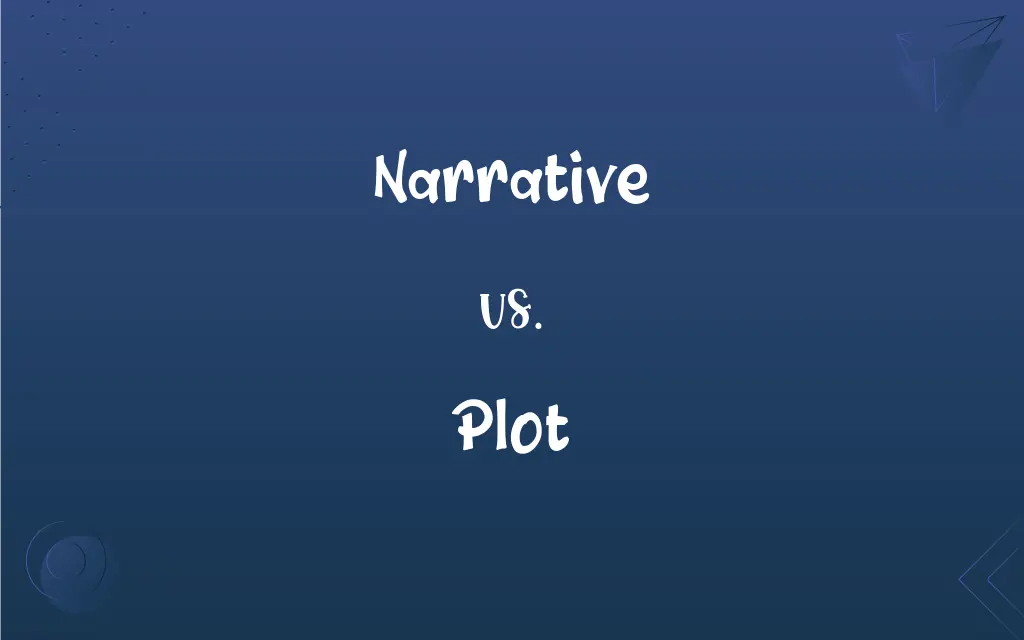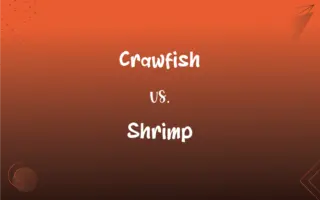Narrative vs. Plot: What's the Difference?
Edited by Aimie Carlson || By Janet White || Published on December 27, 2023
Narrative is the way a story is told, including structure, voice, and perspective, while plot is the sequence of events that make up the story.

Key Differences
A narrative encompasses the broader aspect of storytelling, including how the story is structured and delivered. The plot, in contrast, refers specifically to the sequence of events and actions within the story.
Narratives involve characters, settings, and themes, and can be presented in various structures like linear, non-linear, or circular. The plot is about the events themselves, focusing on causality, conflict, and resolution.
The narrative determines how the story engages and affects the reader, shaping their experience through the storyteller's voice. The plot provides the framework for the narrative, driving the story forward through its unfolding events.
Different narratives can be formed around the same plot, offering varied perspectives and styles. A plot, however, is a consistent sequence of events that remains largely unchanged regardless of narrative style.
The narrative is the lens through which the plot is viewed, influencing the reader's understanding and interpretation of the story. The plot is the backbone of the story, essential for driving the narrative forward.
ADVERTISEMENT
Comparison Chart
Definition
The way a story is told
The sequence of events in a story
Focus
Structure, perspective, storytelling method
Events, causality, conflict, resolution
Components
Characters, settings, themes, voice
Introduction, rising action, climax, falling action, denouement
Role in Storytelling
Engages the reader, shapes experience
Drives the story, provides structure
Variability
Can change with different storytellers or perspectives
Generally remains consistent across narratives
ADVERTISEMENT
Narrative and Plot Definitions
Narrative
It includes the storyteller's voice and style.
Her narrative style is captivating, full of vivid descriptions.
Plot
It involves the conflict and its resolution.
The plot revolves around the protagonist's struggle against odds.
Narrative
It involves the perspective through which the story is conveyed.
The narrative perspective switches between different characters.
Plot
Plot is the sequence of events in a story.
The plot thickens with an unexpected twist in the story.
Narrative
Narrative encompasses the structure of the story.
The film uses a non-linear narrative to reveal the plot.
Plot
Plot defines the causal sequence of events in the narrative.
Each event in the plot is causally linked to the next.
Narrative
Narrative shapes how the audience perceives the story.
The unreliable narrative in the story keeps readers guessing.
Plot
Plot structures typically include a climax and resolution.
The plot reaches its climax in a dramatic final scene.
Narrative
Narrative refers to the way a story is told.
The novel's narrative shifts between past and present tense.
Plot
It's the backbone of a story, driving it forward.
The intricate plot keeps the readers engaged till the end.
Narrative
A narrated account; a story.
Plot
A small piece of ground, generally used for a specific purpose
A garden plot.
Narrative
The art, technique, or process of narrating
The highest form of narrative.
FAQs
Does every story need a strong plot?
Generally, yes, as the plot is essential for providing structure and direction.
Is plot just about the story's events?
Yes, the plot focuses on the sequence and causality of events.
Is the climax part of the narrative or plot?
The climax is a key component of the plot.
Can a narrative exist without a plot?
While possible, narratives are typically more engaging with a coherent plot.
Can narrative style change the impact of a story?
Absolutely, the narrative style significantly influences how a story is received.
Can a story have multiple narratives?
Yes, a story can be told from different narratives or perspectives.
Are narrative and plot dependent on each other?
Yes, they work together to create a compelling story.
Can the same plot be told with different narratives?
Yes, different narratives can provide new perspectives on the same plot.
Can a narrative change a story's genre?
Yes, the narrative style can influence the genre perception of a story.
Can a good narrative compensate for a weak plot?
Sometimes, a strong narrative can enhance or overshadow a less robust plot.
Is the setting part of the plot or narrative?
The setting is typically considered part of the narrative context.
Does a non-linear narrative affect the plot?
It can change how the plot is perceived but doesn't alter the plot itself.
Is plot more important than narrative?
Both are crucial; the plot is the framework, while the narrative is how the story is told.
How does perspective influence the narrative?
It shapes how and what parts of the story are told to the audience.
Are flashbacks part of the plot or narrative?
They are a narrative technique used to reveal parts of the plot.
Are all narratives linear?
No, narratives can be non-linear, offering a different approach to storytelling.
How does the resolution fit into plot and narrative?
The resolution is a key plot element, often highlighted through the narrative.
Does a complex plot require a complex narrative?
Not necessarily; a complex plot can be told through a simple narrative and vice versa.
Can the narrative alter the story’s outcome?
While it can change the interpretation, it usually doesn't change the actual outcome.
Does the plot include character development?
Yes, character development is often integral to the plot.
About Author
Written by
Janet WhiteJanet White has been an esteemed writer and blogger for Difference Wiki. Holding a Master's degree in Science and Medical Journalism from the prestigious Boston University, she has consistently demonstrated her expertise and passion for her field. When she's not immersed in her work, Janet relishes her time exercising, delving into a good book, and cherishing moments with friends and family.
Edited by
Aimie CarlsonAimie Carlson, holding a master's degree in English literature, is a fervent English language enthusiast. She lends her writing talents to Difference Wiki, a prominent website that specializes in comparisons, offering readers insightful analyses that both captivate and inform.






































































